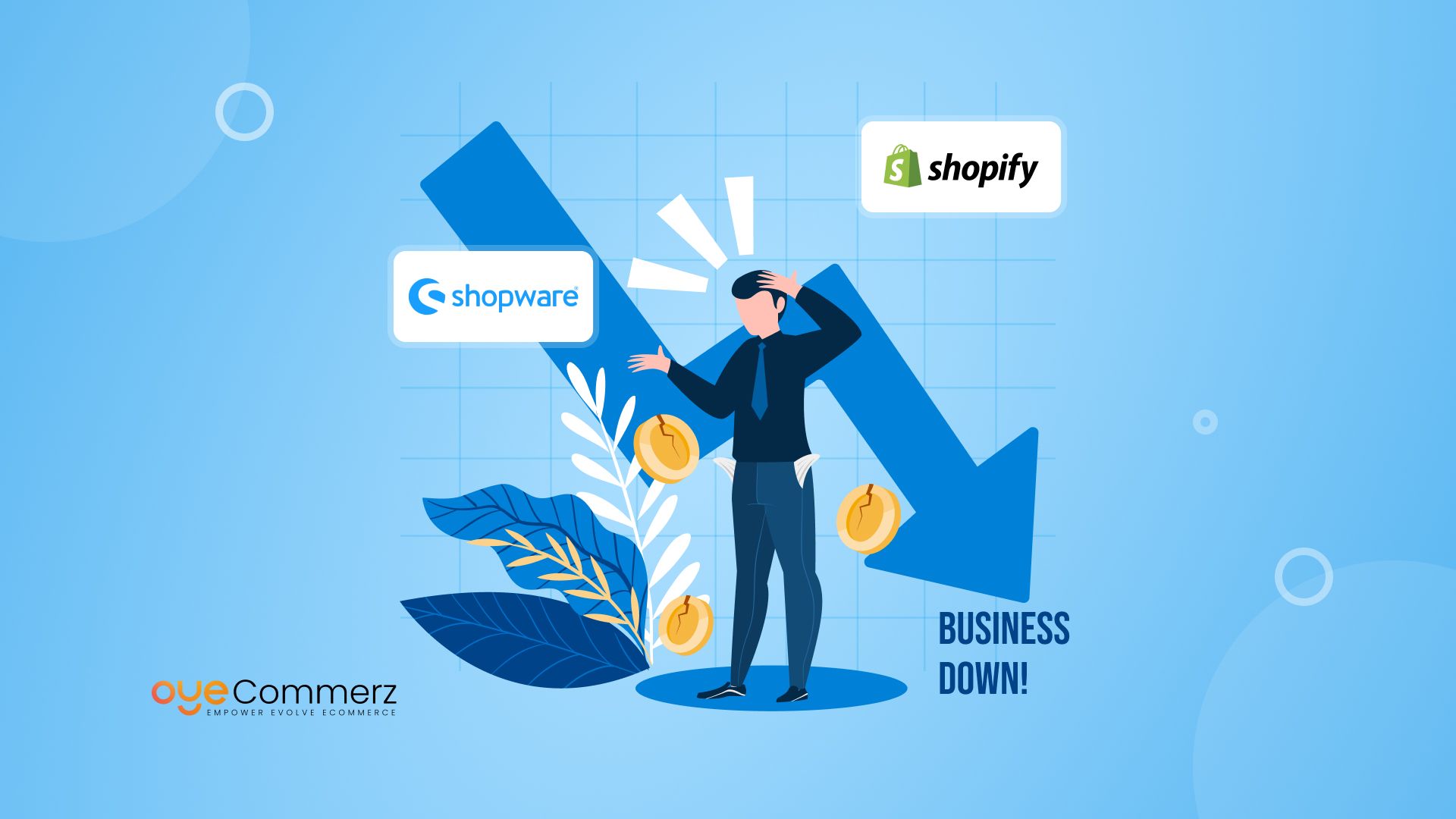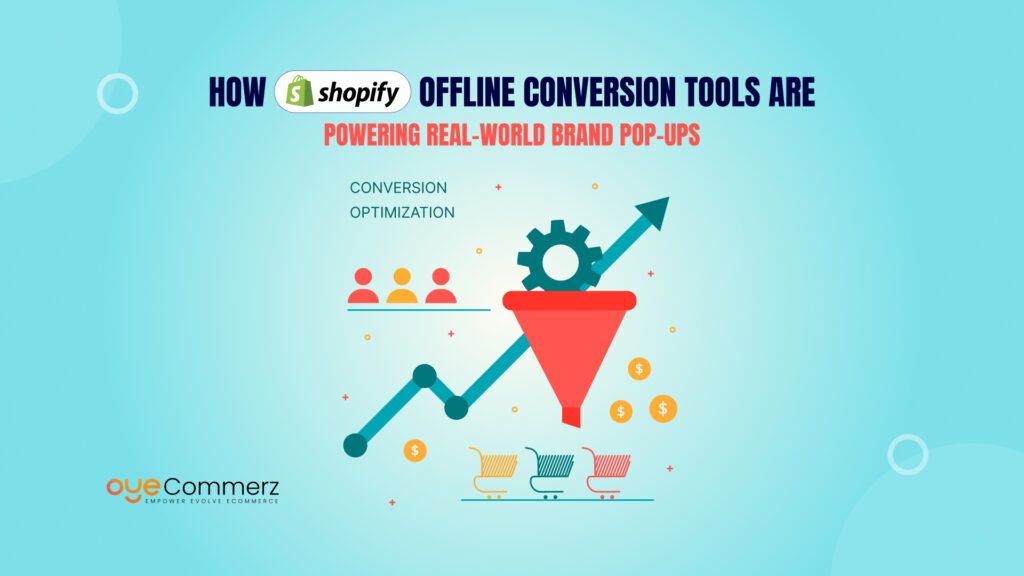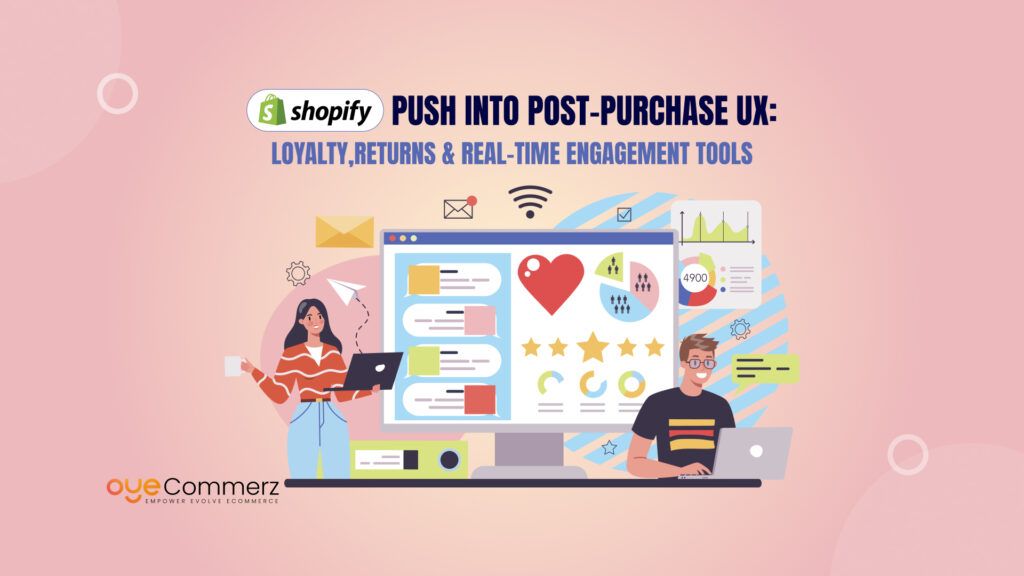Is Shopware Slowing Your Business Down? Discover how migrating to Shopify can streamline operations, boost performance, and drive seamless growth struggling with slow performance and limited scalability on your current platform? If your business feels bogged down by the limitations of Shopware, it might be time for a change. Migrating to Shopify could be the key to unlocking seamless growth and improved efficiency.
In fact, studies show that businesses making the switch experience up to a 30% boost in sales within the first six months. With Shopify’s superior app development capabilities and robust features, you’ll be able to customize your store, improve speed, and deliver an exceptional shopping experience that keeps customers coming back. Let’s explore how this transition can take your business to the next level.
Table of Contents
ToggleUnderstanding Shopware: Basics for New E-Commerce Businesses
What is Shopware?
Shopware is a flexible, open-source e-commerce platform widely used by businesses to build and manage their online stores. Known for its customizable features and plugin ecosystem, Shopware allows brands to tailor their online presence to meet specific needs.
Key features include:
- Open-Source Flexibility: Developers can create custom functionalities tailored to unique business requirements.
- Plugin Ecosystem: A wide range of plugins to enhance store functionality.
- Integrated Marketing Tools: Features like shopping worlds and storytelling tools to engage customers.
Who Uses Shopware?
Shopware is commonly used by businesses that:
- Operate in niche markets requiring unique customization.
- Want control over their platform with open-source capabilities.
- Have in-house technical expertise to manage and optimize the platform.
Why Shopware May Be Slowing Your Business Down
While Shopware offers significant advantages, it can become a challenge for businesses aiming for rapid growth or operational simplicity. Some common issues include:
- Limited Scalability: Shopware struggles to handle high traffic or large product catalogs without significant technical intervention.
- Plugin Overload: Relying on too many plugins can complicate maintenance and affect store performance.
- High Technical Dependency: Non-technical users may find the platform difficult to manage, requiring constant developer support.
- Performance Bottlenecks: Complex setups can lead to slower load times, directly impacting user experience and sales.
Is Shopware Right for Beginners?
For new e-commerce entrepreneurs, Shopware may seem appealing due to its customization potential. However, the platform often requires significant technical expertise and resources to operate effectively and also Shopware Slowing Your Business Down.For those seeking simplicity, scalability, and cost efficiency, Migrate to Shopify can be a better fit.
Challenges Businesses Face with Shopware
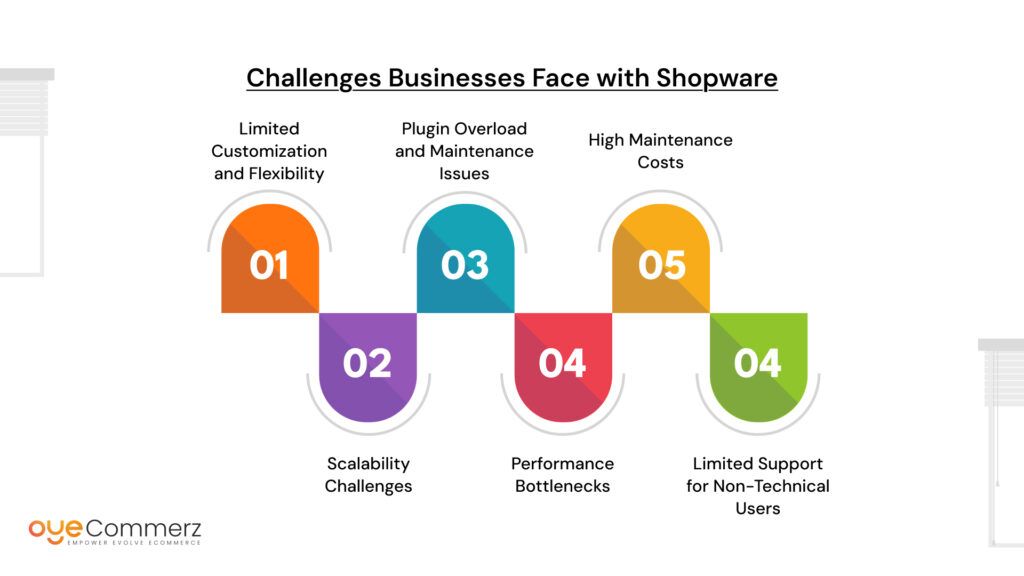
When running an e-commerce business on Shopware, you may encounter several limitations that hinder your growth and operational efficiency. These challenges often leave business owners questioning whether Shopware slowing your business down and seeking alternative solutions like Shopify.
1. Limited Customization and Flexibility
While Shopware offers a range of customization options, they often require significant technical expertise. Many businesses find that creating unique designs or adding tailored features becomes cumbersome, especially without a dedicated development team.
- Impact: Reduced ability to create a distinct brand identity.
- Result: Businesses struggle to stand out in competitive markets.
2. Scalability Challenges
Shopware’s scalability is often limited for businesses experiencing rapid growth or managing high traffic volumes. Scaling up may involve costly server upgrades and technical adjustments.
- Impact: Difficulty handling spikes in website traffic or large product catalogs.
- Result: Missed sales opportunities during peak periods.
3. Plugin Overload and Maintenance Issues
Shopware relies heavily on plugins for additional functionality, which can lead to:
- Compatibility Issues: Plugins may conflict with each other after updates.
- Increased Costs: Paid plugins can quickly add up.
- Complex Maintenance: Frequent updates and troubleshooting are required.
- Result: Increased downtime and operational inefficiencies.
4. Performance Bottlenecks
Slow website performance is one of the major reasons businesses feel that Shopware slowing your business down. Factors contributing to this include:
- Complex setups requiring heavy server resources.
- Poorly optimized plugins and customizations.
- Limited built-in optimization tools.
- Result: Higher bounce rates, lower search engine rankings, and reduced conversions.
5. High Maintenance Costs
Shopware’s self-hosted nature demands constant attention to hosting, security updates, and bug fixes. Businesses without technical teams often need to outsource these tasks, leading to higher operational costs.
- Impact: Increased financial burden.
- Result: Less budget available for growth initiatives like marketing and product expansion.
6. Limited Support for Non-Technical Users
For users without coding knowledge, managing Shopware can be daunting. The platform’s interface and reliance on developer support make it challenging for small teams or individuals to operate efficiently.
- Impact: Delays in resolving issues and updating the store.
- Result: Loss of time and productivity.
Is Shopware Holding Your Business Back?
If these challenges sound familiar, it’s time to evaluate whether your platform is helping or hindering your growth. Many businesses have found that Shopware slowing their business down and Migrate to Shopify for a more streamlined and scalable e-commerce experience
How Shopify Solves the Challenges of Shopware
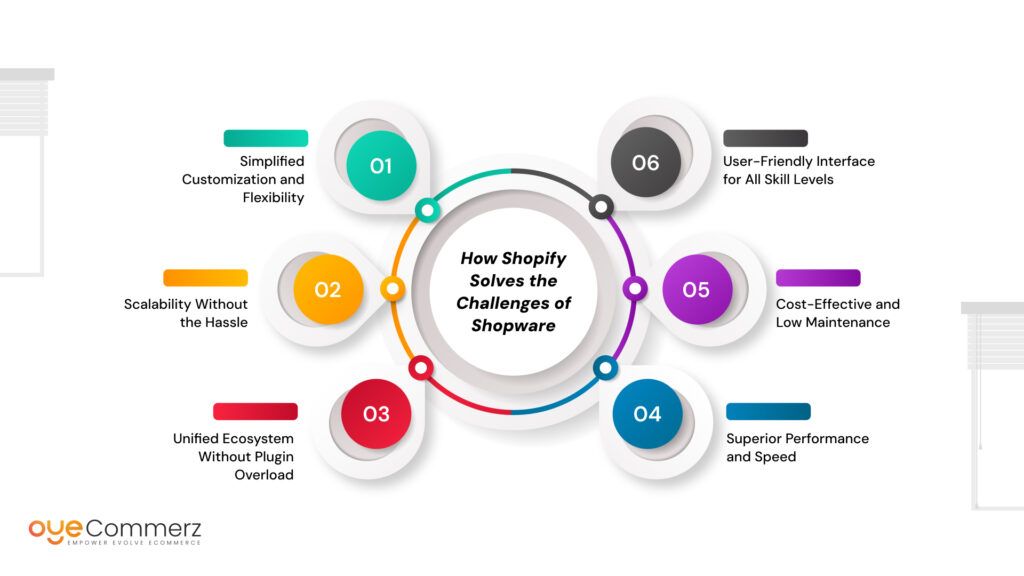
If you’ve been asking yourself, “Is Shopware slowing your business down?”, Shopify could be the solution you need. Shopify’s user-friendly interface, scalability, and performance-driven features make it a compelling alternative for businesses seeking seamless growth and reduced operational complexity. Let’s explore how Shopify addresses the key challenges of Shopware.
1. Simplified Customization and Flexibility
Shopify offers a wide range of professionally designed themes and an intuitive drag-and-drop editor, making it easy to create a unique and visually appealing online store without coding expertise.
- Benefits:
- Extensive theme library tailored for various industries.
- Customization options available for both beginners and advanced users.
- Built-in tools to enhance branding and user experience.
- Outcome: Faster store setup and a more engaging shopping experience for customers.
2. Scalability Without the Hassle
Unlike Shopware, Shopify is a fully hosted platform designed to handle businesses of all sizes, from startups to enterprises.
- Benefits:
- Automatic scaling during traffic spikes (e.g., holiday sales or flash deals).
- Seamless management of large product catalogs.
- Global reach with multi-currency and multi-language support.
- Outcome: A platform that grows with your business, ensuring consistent performance even during peak demand.
3. Unified Ecosystem Without Plugin Overload
Shopify minimizes dependency on third-party plugins by offering an integrated suite of tools for marketing, analytics, and store management.
- Benefits:
- Built-in features like abandoned cart recovery, SEO optimization, and payment gateways.
- Access to the Shopify App Store for additional tools, vetted for quality and compatibility.
- Outcome: Reduced maintenance headaches and streamlined store operations.
4. Superior Performance and Speed
Shopify’s cloud-based infrastructure is optimized for speed and reliability, eliminating the performance issues often associated with Shopware.
- Benefits:
- Fast page load times, improving user experience and reducing bounce rates.
- Automatic updates to ensure optimal performance.
- Reliable hosting with 99.99% uptime.
- Outcome: A smoother shopping experience that boosts customer satisfaction and sales.
5. Cost-Effective and Low Maintenance
Shopify eliminates the need for costly server management and technical updates, providing a predictable pricing model that fits businesses of all sizes.
- Benefits:
- Transparent subscription plans with no hidden costs.
- No need for self-hosting or security updates.
- Dedicated support for technical and operational issues.
- Outcome: More time and resources to focus on growing your business.
6. User-Friendly Interface for All Skill Levels
Shopify’s intuitive dashboard and comprehensive documentation make it an ideal choice for non-technical users.
- Benefits:
- Easy-to-navigate interface for store management.
- Step-by-step guides and 24/7 customer support.
- A vibrant community of Shopify users and experts.
- Outcome: Empowering business owners to manage their stores independently, reducing reliance on developers.
Why Migrate to Shopify?
Shopify’s holistic approach to e-commerce ensures that businesses can focus on growth without worrying about technical complexities. If you’ve experienced challenges like limited scalability, plugin overload, or performance bottlenecks with Shopware, Shopify provides a robust and reliable alternative.
Shopware vs. Shopify: A Detailed Comparison
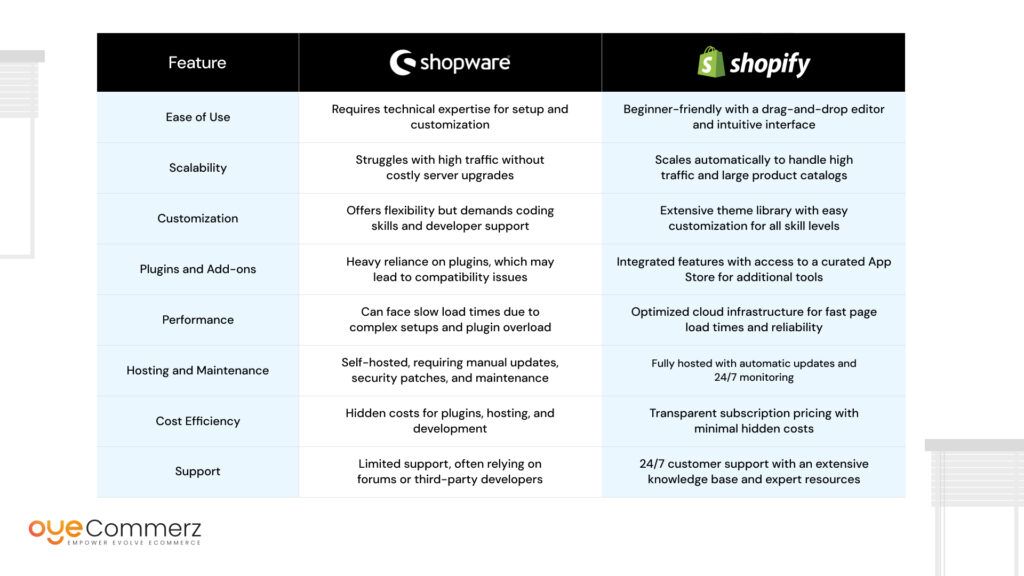
If you feel that Shopware is slowing your business down, it’s essential to evaluate how it stacks up against Shopify. Below is a detailed comparison of both platforms, focusing on critical features that influence e-commerce performance, scalability, and ease of use.
Key Takeaways from the Comparison
- For Beginners: Shopify’s simplicity and out-of-the-box features make it an ideal choice for those new to e-commerce. Shopware, on the other hand, demands a steeper learning curve and more resources.
- For Scaling Businesses: Shopify’s automatic scalability and robust hosting ensure seamless growth without technical hassles.
- For Performance: Shopify outshines Shopware with its fast load times, optimized infrastructure, and lower maintenance requirements.
Is It Time to Migrate to Shopify?
If the limitations of Shopware are holding your business back, Shopify’s performance-driven features and ease of use offer a significant advantage. Whether you’re starting out or scaling up, Shopify provides the tools and infrastructure to support your e-commerce journey effectively.
Seamless Shopware to Shopify Migration with OyeCommerz
Is Shopware holding your business back?
OyeCommerz offers seamless migration to Shopify, ensuring a smooth, efficient, and optimized transition. From full data migration and SEO-safe transfers to custom Shopify store setup and powerful app integrations, we handle it all with zero data loss.
Whether you’re a small business or a large enterprise, we deliver tailored, cost-effective solutions designed for speed, usability, and growth. Plus, our ongoing support ensures you get the most out of when MIgrate to Shopify.
Make the move with OyeCommerz, Contact us to Start your Shopify success.
Contact to Migrate your Site to Shopify Now
Conclusion
If you’ve found that Shopware slowing your business down, it’s time to make a change. Shopify’s powerful, user-friendly platform offers the scalability, speed, and customization options that modern e-commerce businesses need to thrive. Whether you’re a beginner or an experienced business owner, Shopify provides the tools to enhance your operations and take your business to new heights.
Migrate to Shopify may seem like a challenge, but with OyeCommerz by your side, the process is smooth, efficient, and stress-free. Our expert team ensures that your data is transferred securely, your store is optimized for performance, and your SEO rankings remain intact throughout the transition.
Frequently Asked Questions
Migration can take anywhere from a few days to several weeks, depending on store complexity and data size. Professional services can speed up the process with minimal downtime.
SEO may be impacted if not handled carefully, but with proper 301 redirects and best practices, rankings can be maintained. It’s crucial to plan SEO strategies during migration.
The cost varies based on the size and complexity of your store, typically ranging from $3,000 to $12,000. It depends on whether you use DIY methods or hire professionals.
Customer data, including order history, can be transferred during migration, but passwords cannot be moved. Customers will need to reset their passwords on Shopify.
While DIY migration is possible, experts ensure a smooth, error-free transition, maintaining data integrity and minimizing downtime. It’s highly recommended for complex stores.

